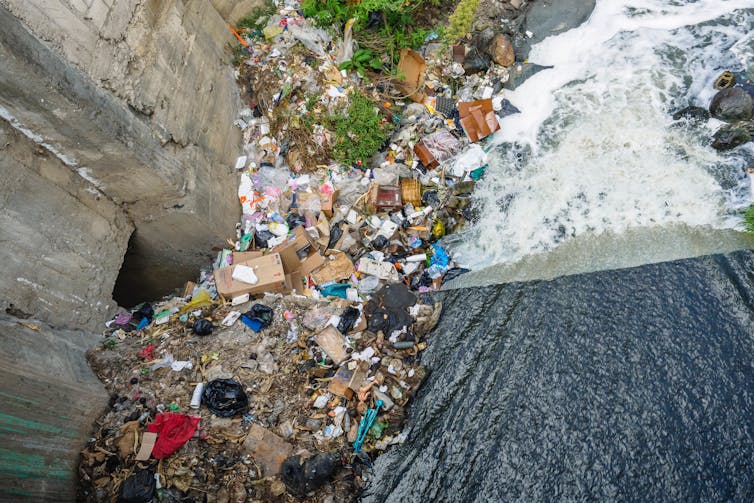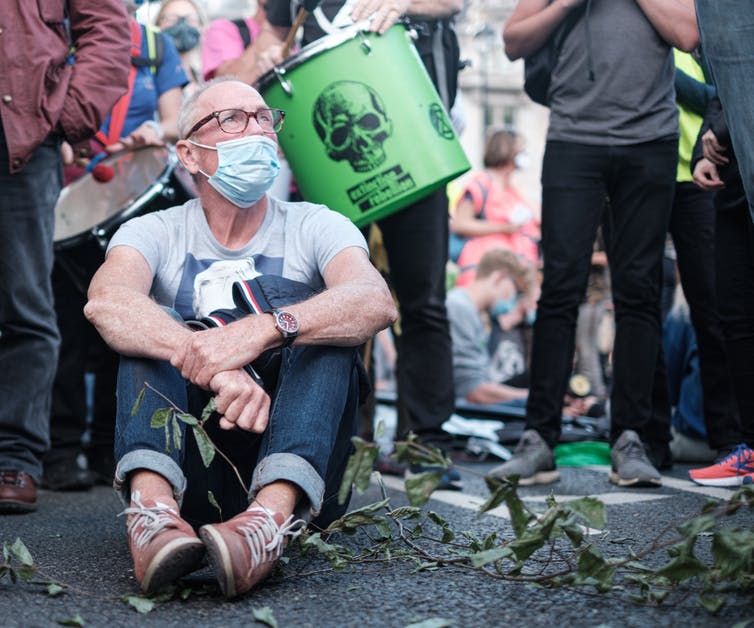Editor’s note: This essay reminds me of premise ten from Derrick Jensen’s book Endgame: “The culture as a whole and most of its members are insane. The culture is driven by a death urge, an urge to destroy life.”
Samuel Alexander, The University of Melbourne
According to The Parable of the Poisoned Well, there once lived a king who ruled over a great city. He was loved for his wisdom and feared for his power. At the heart of the city was a well, the waters of which were clean and pure and from where the king and all the inhabitants drank. But one evening an enemy entered the city and poisoned the well with a strange liquid. Henceforth, all who drank from it went mad.
All the people drank the water, but not the king, for he had been warned by a watchman who had observed the contamination. The people began to say, “The king is mad and has lost his reason. Look how strangely he behaves. We cannot be ruled by a madman, so he must be dethroned”.
The king sensed his subjects were preparing to rise against him and grew fearful of revolution. One evening he ordered a royal goblet to be filled from the well and drank from it deeply. The next day there was great rejoicing among the people, for their beloved king had finally regained his wisdom and sanity.
In his 1955 book The Sane Society, psychoanalyst Erich Fromm suggests nothing is more common than the assumption that we, people living in the advanced industrial economies, are eminently sane. Nevertheless, Australia’s Department of Health reports that almost half of Australians aged 16 to 85 will experience a mental disorder at some point in their lives.
According to Fromm, we are inclined to see incidents of mental illness as individual and isolated disturbances, while acknowledging — with some discomfort, perhaps — that so many of these incidents should occur in a culture that is supposedly sane. Fromm haunts our self-image even today, attempting to unsettle these assumptions of sanity:
Can we be so sure that we are not deceiving ourselves? Many an inmate of an insane asylum is convinced that everybody else is crazy, except himself.
In an age now widely described as the Anthropocene, the conventionally held distinction between sanity and insanity is at risk of collapsing … and taking our civilisation with it.
The line shifts over time
At least since Michel Foucault’s Madness and Civilization (1961), it has been understood that the idea of (in)sanity is an evolving, socially constructed category. Not only does the medical validity of mental health diagnoses and treatments shift with the times, but what has been judged “sane” in one era has the potential to blur into what is not in another — and without announcement.
This can disguise the fact that social practices or patterns of thought that may once have been considered healthy may now be properly diagnosed as unhealthy. And while this can apply to individual cases, there is no reason to think it should not also apply more broadly to a society at large. A society might go insane without being aware of its own degeneration.
One does not need to be a conspiracy theorist to recognise, with Foucault, that power shapes knowledge. If profits and economic growth are the benchmarks of success in a society, it simply may not be profitable to expose a society as insane, and even members of an insane society may sooner choose wilful blindness than look too deeply into the subconscious of their own culture.

How can we be so sure of our own sanity, asked psychoanalyst Erich Fromm, pictured in 1974. Wikimedia Commons
If our society is not sane — and I find myself pointing towards this thesis — another question follows: what might sanity look like in an insane world?
I come to these questions without mental health training or expertise, but simply as an ordinary member of late-stage capitalist society, one suffering in his own way and trying to understand the mental health burdens that accompany our ecocidal and grossly inequitable mode of civilisation. I make no comment on the very real biophysical causes for mental illness, such as chemical imbalances or physical injury.
Instead, I reflect, at a “macro” level, on the sanity or insanity of the dominant culture and political economy in contemporary capitalist societies such as Australia, asking how the world “out there” can impact the inner dimension of our lives.
Following Fromm’s lead, I inquire not so much into individual pathology, but into what he calls “collective neuroses” and “the pathology of normalcy”. Of course, collective neuroses are not easily observed, for they are, by nature, the background fabric of existence and so easily missed.
Drinking the Kool-Aid
At first, I tried to distil a positive life lesson from the Parable of the Poisoned Well, but I quickly realised this was the wrong way to approach it.
There is arguably no moral guidance in the fable, only an amoral social insight. If there is a lesson, it is that sometimes it is easier or safer simply to conform to common assumptions or practices, no matter how dubious or absurd they are, to avoid being socially ostracised. If you do not go with the flow you may be deemed mad, so it may be better just to blend in and drink the Kool-Aid.
A second reading of the parable points to the relativity of notions of sanity, again suggesting that what’s sane or insane isn’t fixed, but is culturally dependent: a person is sane if they “function” well enough in the society, even if that society is sick.
It is this relativity of sanity that Fromm calls into question in The Sane Society. “The fact that millions of people share the same vices,” he wrote, “does not make these vices virtues, the fact that they share so many errors does not make the errors to be truths, and the fact that millions of people share the same forms of mental pathology does not make these people sane.”
He felt that society needed certain objective conditions to be sane, including environmental sustainability. If too many of humankind’s most basic needs were not being met despite unprecedented capacity, he felt it would be proper to declare a society sick, even if the behaviour producing the sickness was widespread and validated by its own internal cultural logic.
What is “normal” behaviour today? The climate emergency points to our fatal addiction to fossil fuels. We know their combustion is killing the planet, but we can’t help ourselves. The Intergovernmental Panel on Climate Change was established in 1988 to advise us on the science of climate change, yet here we are, more than 30 years later, and carbon emissions continue to rise (excepting only the years of financial crisis or pandemic). We emit 37 gigatons of carbon dioxide into the atmosphere each year, in full knowledge of their impacts.
In 2019, fossil fuels supplied around 85 per cent of global primary energy demand. Driven by a fetish for economic growth, voters support politicians who bring lumps of coal into a parliament for a laugh and enthusiastically build new fossil fuel power stations. It is a tragedy disguised as a grim joke.
Scientists warn that current trajectories of climate heating are not compatible with civilisation as we know it, with potentially billions of lives at risk this century, both human and non-human. You know something is wrong when the Arctic is burning. And yet nothing is more “normal” than hopping into a fossil-fuelled car or consuming products shipped around the world to satisfy the carboniferous desires of affluent society.
We’re deforesting the planet and destroying topsoil to feed a population that is growing by over 200,000 people every day. The United Nations projects we’ll have reached almost ten billion people by mid-century.
This human dominance of the planet under global capitalism is contributing to a holocaust of biodiversity loss, with the World Wildlife Fund recently reporting that populations of vertebrate species have declined by 68 per cent since 1970. We are living through the sixth mass extinction, driven by human economic activity that is not just normal but encouraged, rewarded and widely admired.
Empire marches on like a snake eating its own tail, pursuing growth for growth’s sake — the ideology of a cancer cell.
Unmoored, lost at sea
A spiritual malaise seems to be spreading throughout advanced capitalist societies, as if the material rewards of consumerism have failed to fulfil their promise of a happy and meaningful existence. Scholars publish books about it: Robert E Lane’s The Loss of Happiness in Market Democracies, David G Myers’ The American Paradox: Spiritual Hunger in an Age of Plenty, and Clive Hamilton and Richard Denniss’ Affluenza: When Too Much Is Never Enough.
For whom, then, do we destroy the planet? Is a greater abundance of “nice things” what we are lacking in the overdeveloped world? Or is there, as historian and philosopher Lewis Mumford once opined, an inner dimension to our crises that must be resolved before the outer crises can be effectively met?

Nice things that fail to meet our needs become trash, polluting the planet. Alexander Schimmeck/Unsplash, CC BY
How easy it is to live life regurgitating the prewritten script of advanced industrial society: cogs in a vast machine, easily replaced. Perhaps we see our disenchantment reflected in the eyes of those tired, alienated commuters, a class into which it is so easy to fall simply by virtue of being subjects of the capitalist order. We all know that there is more to life than this.
We find ourselves living in an age where the old dogmas of growth, material affluence and technology are increasingly exposed as false idols. Like a fleet of ships that has been unmoored in a storm, our species is drifting in dangerous seas without a clear sense of direction.
Where are the new sources of meaning and guidance that all societies need to fight off the ennui? Pioneering sociologist Émile Durkheim used the term “anomie” to refer to a condition in which a culture’s traditional norms have broken down without new norms arising that can give sense to a changing world. Perhaps this is the term that best explains our existential condition today.
I am reminded of a poem by Michael Leunig:
They took him on a stretcher
To the Home for the Appalled
Where he lay down in the corner
And be bawled and bawled and bawled.
‘There’s nothing wrong with me,’ he wailed,
When asked about his bawling,
‘It’s the world that needs attention;
It’s so utterly appalling.’
What is a sane reaction to an insane society?
One could go on, but it would be perverse to do so. “Doom porn” is not my business or purpose. But there is a case for diagnosing our society as insane — not as rhetorical strategy, but in the pursuit of literal truth.
If an individual knowingly destroyed the conditions of his or her own existence, we’d question their sanity. If a mother only fed her children if she could make a profit, we’d doubt the soundness of her mind. If a father took all the household wealth and left the rest of the family in destitution while building bombs in the basement that could destroy the neighbourhood, we’d call him psychopathic.
And yet these are characteristics of our society as a whole. Fromm would not permit us to diagnose ourselves and our society as sane just because the actions that produce the features outlined above are considered “normal”. There is a pathology to our normalcy — my own regrettably included — and this pathology is no less pathological just because it is shared by millions upon millions of people.
There are negative mental health effects that might naturally and justifiably arise when otherwise sane people find themselves living in an insane world. The paradox that threatens to emerge has already been variously noted.
In Welcome to the Monkey House, Kurt Vonnegut Jnr writes, “a sane person in an insane society must appear insane”. Thomas Stephen Szasz contends: “Insanity is the only sane reaction to an insane society”. And the British psychiatrist R. D. Laing said insanity was “a perfectly rational adjustment to an insane world”. I think I recall Star Trek’s Dr Spock saying something similar.
How can we not get depressed when reading the newspapers today or watching our politicians go about their business with such confident incompetence? How can we not grieve the wildlife and natural habitat being destroyed each moment? What parent can look to the future and not feel a foreboding dread at what world their children and grandchildren will inherit?
At the same time, and because of that dread, it is hard to maintain the emotional resources to care for strangers or “join a movement” when stress, agitation, worry and busyness clutter our mental lives. This can make society seem like a harsh place, lacking in generosity of spirit or compassion.
Whether it’s from watching white supremacists march or listening to climate deniers speak from platforms in parliament and mass media, a nausea sets in, a sickness not so much of the mind but of the soul.
This is an existential diagnosis, not a medical or psychiatric one. It would be wrong to make peace with this madness. The world we live in should not be treated as normal, and it should not be a sign of good health to become “well adjusted” to a society that is casually practising ecocide, celebrating narcissism, institutionalising racism and assessing the value of all things according to the cold logic of profit maximisation.
It is okay not to feel okay
We must not assume behaviour that makes an individual “functional” within a sick society is sufficient evidence of their sanity. In such a society, it is okay not to feel okay, to cry and feel grief, to feel dread and alienation. In our tears, let us find solidarity, for we are not alone.
Remember this when you wake up prematurely in the morning with an anxiety without object, or as you stare at the ceiling late at night as you try to fall asleep. You are not losing your mind. It is precisely because you have a grip on reality that reality seems so out of whack.
On my third reading of the Parable of the Poisoned Well, I noticed something I had missed — it was the watchman, the man who warned the king not to drink the poisoned water the rest of the citizenry had already consumed.
Wanting to quash the revolutionary sentiment, the king succumbed to public pressure and eventually drank from the well in order to fit in. But what about the watchman? Is it possible he never drank the poisoned water and remained sane in an insane society? Did that made him seem mad?
Perhaps my thoughts here are those of a watchman, someone who has tried not to drink the Kool-Aid, who has attempted to resist the pathology of normalcy.
Admittedly, I have questioned my own sanity at times — when, for example, I’ve found myself dancing in the middle of a busy intersection with Extinction Rebellion, risking arrest. What had driven me to act in a way that sees me surrounded by police with batons, guns and pepper spray? They sure looked mad.
Call me crazy, but I’ll finish with the words often attributed to Friedrich Nietzsche: “Those who were seen dancing were thought to be insane by those who could not hear the music”.
This piece is an edited extract, republished with permission from GriffithReview72: States of Mind, edited by Ashley Hay.![]()
Samuel Alexander, Research fellow, Melbourne Sustainable Society Institute, The University of Melbourne
This article is republished from The Conversation under a Creative Commons license. Read the original article.



I was reminded of an R.D. Laing parable, even before he was mentioned in the article. Laing also cited the example of a little girl being referred for psychiatric treatment, because she believed she was a bomb — while living in a supposedly sane civilization, which built bombs that would destroy the world if used, and calling it a “deterrent.”
In reading about the environment and our constant attacks on it, the thing I find most astounding is that the “remedies” offered by our “leaders” include everything BUT simply stopping the attacks and living in harmony with nature, like every other species on Earth.
We’re like the inmate I visited on death row, who had a compulsion for breaking the rules, and doing it in a way that always made sure he got caught. Along with such things as committing a double murder and all but leaving a signed confession at the scene, he once took drugs onto the exercise yard at San Quentin, hidden in the back of a portable radio — which was also forbidden on the yard, but far more visible than the drugs.
The latest industrial gem is a company that would remove carbon from the atmosphere by sucking air into huge fans, that would cover an area the size of a football field. The carbon would then be separated from the oxygen, using toxic chemicals that would turn it into pellets. Then the pellets would be transported to old oil wells, converted back into a gas, and pumped into the wells for supposedly permanent storage. This would force more oil to the surface, to be transported, refined, transported again, and then burned for fuel, so that it could be sucked out of the air once more, and pumped back into the ground.
Note the number of pollution-causing operations that are added to the cycle, which in the end does nothing but to take carbon out of the air, and release more carbon into the air, so that it could be sucked out again. And it would only take around 40,000 of these air-sucking plants, run by additional power plants, to achieve “net zero” — except, of course, for the emissions caused by all the additional sucking, converting, and transporting, along with the raw material extraction, transportation, and manufacture of several million giant fans.
I’m likewise reminded of the great deal I recently found online, for a folding bicycle from Taiwan: only $179! — plus $240, shipping and handling.
As the preeminent psychiatrist Dr. R.D. Laing said in the introduction to The Politics of Experience (probably the best and most important psychiatric book ever written), how could anyone in this society claim that a normal person is sane?
Good essay, though it could have been a lot stronger. There is no doubt that this society is totally insane. Any society that thinks that it can continue to add people, kill other beings except directly for food, drill & dig into the Earth and extract things, create and emit all sorts of unnatural things that pollute all life, pollute its own planet, etc., and all without severe consequences, is objectively insane.
This has nothing to do with “an urge to destroy life” as DGR and Derrick Jensen put it in the introduction. I have great respect for Jensen, but he’s way off base on that. Instead, it’s about lusting after material things and failing to evolve properly mentally and spiritually. If you are obsessed with the physical/material world, of course you’ll lust after material things. This will cause death in many forms in the long run, including death of the planet, the most important one, but it’s not because people want to destroy life; it’s because they’ve been on the wrong track for at least 10,000 years and desire all the wrong things while not desiring any of the right ones. And to be clear, this has nothing to do with left v. right or economic politics, because the left obsesses on material things just like the right does, it just wants them distributed more fairly.
As Laing and others have pointed out, “sanity” and “insanity” can be totally relative and quite subjective. Instead of obsessing on that, a much better distinction would be whether a person is delusional. Even that has a measure of relativity and subjectivity, as a person from a culture that lives in nature would rightfully see a person living in modern society as delusional, and vice versa. But if you think that the grizzly is your pet dog or a tree and the grizzly kills you for trying to pet or hug her, you were objectively delusional.
An astute analysis. Fromm also focused on what he called the necrophilous personality. This perspective supports the structural analysis given by Samuel. From my book, Earth Emotions (2019), I attempt to being the personal and the structural together:
“Eco-Necrophilia
At its extreme, the complete lack of empathy for life and hostility towards it, can manifest as a form of necrophilia or love of death. The support for life is over-ridden by the greed for wealth and ‘productivity’, beyond that which the Earth can supply without the loss of ecosystem vitality. Greed can trump life in the short-term. Fromm extended the concept of necrophilia beyond a sexual perversion to a whole approach to life and death. In The Heart of Man he argued:
‘While life is characterized by growth in a structured functional manner, the necrophilous person loves all that does not grow, all that is mechanical. The necrophilous person is driven by the desire to transform the organic into the inorganic, to approach life mechanically, as if all living persons were things … Memory, rather than experience — having, rather than being — is what counts. The necrophilous person can relate to an object — a flower or a person — only if he possesses it; hence a threat to his possession is a threat to himself, if he loses possession he loses contact with the world … He loves control, and in the act of controlling he kills life.’
The connection between necrophilia, understood in this way, and the commodification of nature under Capitalism, is all too easy to make. The tendency to want to put dollar values on nature to value ‘it’ as property in order to ‘save’ it, under a Neo-Liberal version of Capitalism, is a necrophilous version of turning life and living processes into dead ‘things’. Along with the commodification of nature, so too do our Earth emotions become commodified and are ultimately killed (meuacide).
New forms of eco-necrophilia have emerged in the twenty first century. In the digital world, where death and mayhem can be conducted within ‘realistic’ games with impunity, a form of indifference to the suffering of others can be transferred easily into a failure to even perceive the suffering of others, including non-human beings in the natural world. Such a condition might even be exacerbated by witnessing violence and death in the natural world only via natural history documentaries on television or DVD. The reality of death is never revealed, because it has become dulled to our senses, and, in the case of the stench of death, completely removed from our everyday experience.”
We live in a suicidal culture of addiction. That addiction is causing the death of life on this planet. Our culture is dying and it needs an intervention. That will not come from the state or the mainstream media or academia or business. It can only come from us, working together to change it. We need more sober people who want life to continue.
“It is no measure of health to be well-adjusted to a profoundly sick society.”
― Jiddu Krishnamurti